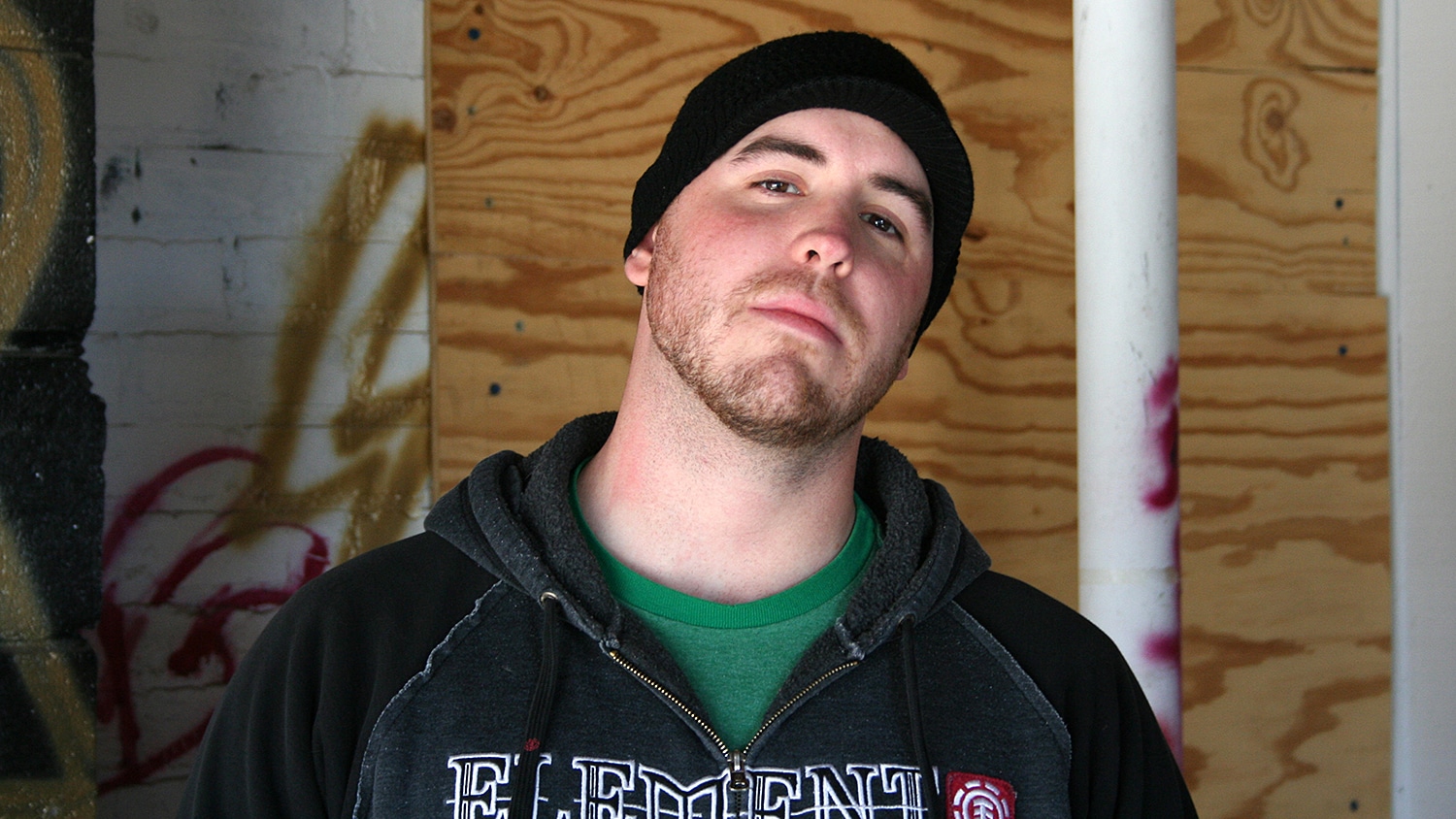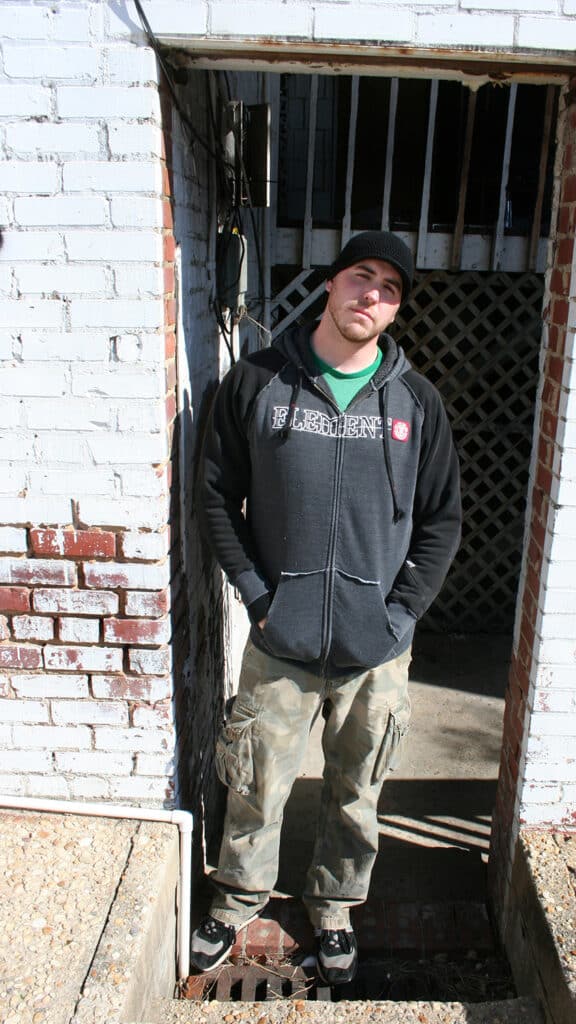Rough Draft
How an angry, disaffected dropout became one of the most promising young writers in the United States.

If he were a character in a story, Josh Eure wouldn’t necessarily be all that endearing. He’s quiet, for one thing, and in a way that makes you want to add, “too quiet.” Ask him what he does and he admits to being a kind of punk-rock vocalist. So he sings?
“I scream,” he answers.
It’s not surprising, perhaps, to learn that Eure (pronounced “Your”) dropped out of high school, left home at 15, and worked a series of odd jobs on the Outer Banks that never succeeded in lifting him above the poverty line. And there the story might have taken a predictably depressing turn except that life, unlike a novel, can be completely unpredictable.
To prove it, life delivered a pair of coincidences to Eure last week: news that he had won the highly coveted Dell Magazines Award for Excellence in Undergraduate Science Fiction and Fantasy Writing (formerly the Isaac Asimov Award) and a letter of acceptance to the creative writing program in the graduate school at North Carolina State University.
It was, he says casually, “pretty cool.”
But how did it happen? How did a disaffected teenager, working as a hammock weaver and sleeping on a cot in a garage, end up as one of the most promising young writers in the United States? It’s a long story.
Eure and his twin brother, Jeremy, never knew their father; their parents divorced when the boys were infants. By the time they were 12, they had lived in Elizabeth City, N.C., St. Petersburg, Fla., and Suffolk, Va., but not in the best parts of town.
“It definitely made us tougher,” Eure says. “We competed in boxing for a few years. We also skateboarded and listened to metal and got drunk at too young an age.”
They got a measure of stability in their lives at 13 when their mother married John Eure, who adopted the twins and their brother, Austin. They moved to Eure’s home in Hertford, N.C., a small crafting town in the Albemarle region, famous as the birthplace of baseball legend Catfish Hunter.
“The Eure family is big in that town,” Eure says. “But Jeremy and I were outsiders. We didn’t fit into that town. We sucked at baseball, we didn’t like country music, and we didn’t have Southern accents. We were like foreign kids.”
They were also angry. And so, at 15, Eure hitched a ride with a friend to the Outer Banks and landed a job at a local grocery store.
“I went in and talked to this really fat guy in produce and said, ‘You wouldn’t have a room would you?’ He said, ‘I have a garage.’ So I put a cot in his garage and lived there for two years.”
After quitting the grocery store, Eure tried his hand at any job that would pay the bills, from a belayer on a rock wall to a hang-gliding trainer. Then, while working as a hammock weaver, he became friends with an NC State alumnus who pushed him to aim higher.
“He graduated with an English degree from NC State and he used to talk about the school all the time,” Eure says. “The way he described it, it sounded magical.”
Still, getting accepted to NC State wasn’t easy. Eure still had to earn his GED and complete a series of community college courses. He spent two years at the College of the Albemarle and Wake Tech Community College.
When he received the notice that he’d finally been accepted to NC State, Eure was ecstatic. “I freaked out. Nobody in my family ever got a college degree,” he says.
John Kessel, an accomplished science fiction writer who heads NC State’s creative writing program, admits to underestimating Eure when the student arrived on campus.
“He’s very tall and well-built, like an athlete, and he doesn’t talk a lot,” Kessel says. “At first, I didn’t know much about him.”

After Eure won a campus writing contest with a short story set in a grain elevator in a small farming town, Kessel revised his estimation.
“It was very subtly written and it was surprising how well he crafted the character and the situation,” Kessel says. “Especially since I don’t think he’s ever worked in a grain elevator.”
Kessel and the other professors in the program helped Eure grow as a writer, improving his skills in plotting, dialogue and character development.
“We have skills we’ve developed over 30 or 40 years of writing and can help shorten the process for our students,” he says. “One of the issues Josh had was plotting. I worked with him to help him understand what his characters want or need, what is possible or not possible, what is interesting and what is a cliché. Plotting is almost like a Zen quality. You almost have to be surprised yourself as you develop the plot.”
Eure seems to have taken the lessons to heart. He graduated last fall with an undergraduate degree in creative writing and a well-developed facility for crafting fiction. He hopes to pursue a career in academia, as a professor of creative writing. Writing has become, on more than one level, his life.
“I create the skeletons of my characters and then they become who they are naturally, almost accidentally,” he says. “I don’t lay out a frame. Sometimes they surprise me. They’re alive in some sense.”
In “We Were Real,” the story that won the Dell Magazines Award, Eure weaves a richly dark, futuristic coming-of-age story. The young protagonist – like the author – is a disconnected outsider. In the end, he chooses a path that leads him away from a more predictable climax.
Eure sees the resemblance but says he’s not trying to incorporate autobiographical elements into his writing.
“If I tried to make my characters like me, they’d be boring and flat,” he says. “Nobody’s that self-aware. Sure, there are pieces of me in all of them. But I don’t think a character like me would be that interesting.”
- Categories:


